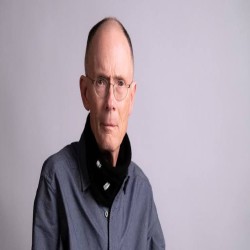
William Gibson
American-Canadian Fiction Writer and Essayist
| Date of Birth | : | 17 Mar, 1948 |
| Place of Birth | : | Conway, South Carolina, United States |
| Profession | : | Author, Actor, Novelist, Science-Fiction Writer, Screenwriter, Essayist, Prosaist |
| Nationality | : | American, Canadian |
| Social Profiles | : |
Twitter
Instagram
|
William Ford Gibson is an American-Canadian speculative fiction writer and essayist widely credited as a pioneer of the science fiction subgenre known as cyberpunk. Beginning his writing career in the late 1970s, his early works were film noir stories, near-future stories that explored the effects of technology, cybernetics, and computer networks on humans, a "combination of bad life and high technology", and helped create an iconography. for the information age before the ubiquity of the Internet in the 1990s. Gibson coined the term "cyberspace" for "pervasive, interconnected digital technology" in his short story "Burning Chrome" (1982), and later popularized the concept in his acclaimed debut novel Neuromancer (1984). These early works of Gibson are credited with the "renewal" of science fiction literature in the 1980s.
After expanding the Neuromancer story with two more novels (Count Zero in 1986 and Mona Lisa Overdrive in 1988), thus completing the dystopian Sprawl trilogy, Gibson collaborated with Bruce Sterling on the alternate history novel The Difference Engine (1990), which It became an important work of the science fiction subgenre known as steampunk.
Early life
Childhood, itinerance, and adolescence
William Ford Gibson was born in the coastal city of Conway, South Carolina, and he spent most of his childhood in Wytheville, Virginia, a small town in the Appalachians where his parents had been born and raised. His family moved frequently during Gibson's youth owing to his father's position as manager of a large construction company. In Norfolk, Virginia, Gibson attended Pines Elementary School, where the teachers' lack of encouragement for him to read was a cause of dismay for his parents. While Gibson was still a young child, a little over a year into his stay at Pines Elementary, his father choked to death in a restaurant while on a business trip. His mother, unable to tell William the bad news, had someone else inform him of the death. Tom Maddox has commented that Gibson "grew up in an America as disturbing and surreal as anything J. G. Ballard ever dreamed".
Draft-dodging, exile, and counterculture
After his mother's death when he was 18, Gibson left school without graduating and became very isolated for a long time, traveling to California and Europe, and immersing himself in the counterculture. In 1967, he elected to move to Canada in order "to avoid the Vietnam war draft". At his draft hearing, he honestly informed interviewers that his intention in life was to sample every narcotic substance in existence. Gibson has observed that he "did not literally evade the draft, as they never bothered drafting me"; after the hearing he went home, purchased a bus ticket to Toronto, and left a week or two later. In the biographical documentary No Maps for These Territories (2000), Gibson said that his decision was motivated less by conscientious objection than by a desire to "sleep with hippie chicks" and indulge in hashish. He elaborated on the topic in a 2008 interview:
When I started out as a writer I took credit for draft evasion where I shouldn't have. I washed up in Canada with some vague idea of evading the draft but then I was never drafted so I never had to make the call. I don't know what I would have done if I'd really been drafted. I wasn't a tightly wrapped package at that time. If somebody had drafted me I might have wept and gone. I wouldn't have liked it of course.
— William Gibson, interview with io9, June 10, 2008
Early writing and the evolution of cyberpunk
After considering pursuing a master's degree on the topic of hard science fiction novels as fascist literature, Gibson discontinued writing in the year that followed graduation and, as one critic put it, expanded his collection of punk records. During this period he worked at various jobs, including a three-year stint as teaching assistant on a film history course at his alma mater. Impatient at much of what he saw at a science fiction convention in Vancouver in 1980 or 1981, Gibson found a kindred spirit in fellow panelist, punk musician and author John Shirley. The two became immediate and lifelong friends. Shirley persuaded Gibson to sell his early short stories and to take writing seriously.
Literary career
Early short fiction
Gibson's early writings are generally near-future stories about the influences of cybernetics and cyberspace (computer-simulated reality) technology on the human species. His themes of hi-tech shanty towns, recorded or broadcast stimulus (later to be developed into the "sim-stim" package featured so heavily in Neuromancer), and dystopic intermingling of technology and humanity, are already evident in his first published short story, "Fragments of a Hologram Rose", in the Summer 1977 issue of Unearth. The latter thematic obsession was described by his friend and fellow author, Bruce Sterling, in the introduction of Gibson's short story collection Burning Chrome, as "Gibson's classic one-two combination of lowlife and high tech."
Beginning in 1981, Gibson's stories appeared in Omni and Universe 11, wherein his fiction developed a bleak, film noir feel. He consciously distanced himself as far as possible from the mainstream of science fiction (towards which he felt "an aesthetic revulsion", expressed in "The Gernsback Continuum"), to the extent that his highest goal was to become "a minor cult figure, a sort of lesser Ballard." When Sterling started to distribute the stories, he found that "people were just genuinely baffled ... I mean they literally could not parse the guy's paragraphs .... the imaginative tropes he was inventing were just beyond people's grasp."
Quotes
Total 0 Quotes
Quotes not found.
